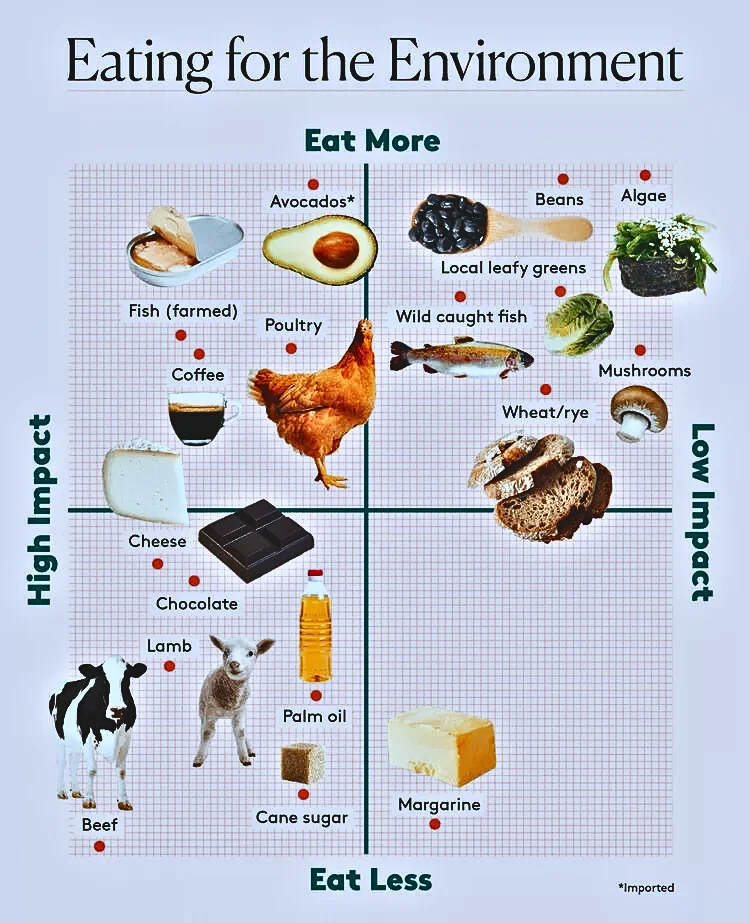When you reach for that organically grown apple or choose a salad over a steak, you’re probably patting yourself on the back for eating healthy and being eco-friendly. But hold that thought! Is there really a one-to-one relationship between what’s good for us, and what’s good for the planet?
Does munching on a salad really mean you’re saving the world? Surprisingly, recent research suggests that what we often consider healthy and planet-friendly might not be the dynamic duo we thought it was.
The Myth of “Green Equals Sustainable“
We’ve all been there, assuming that if it’s good for our bodies, it must be good for Mother Earth. Yet, a study involving over 5,000 university students challenges this notion. These students, a mix of health-conscious and eco-aware young minds, were asked to rank the sustainability and nutritional value of 29 diverse meals served in their university cafeteria. The menu was a smorgasbord of options, ranging from vegan delights to meat-heavy, dairy-rich, and fried temptations.
The Reality Check: Algorithm vs. Intuition
While students were busy making their picks, researchers conducted their own analysis using a specialized algorithm. This tool crunched numbers on greenhouse gas emissions and other factors to scientifically determine each meal’s sustainability and health profile. The result? A fascinating, and often contradictory, comparison.
Students, it seems, were wearing rose-colored glasses. They frequently gave high marks for both health and sustainability to the same dishes. This “halo effect” suggests that if we think a meal is healthy, we’re inclined to believe it’s also kind to the planet.
Case in Point: Surprising Findings
For example, a tomato and basil pasta dish received thumbs-up from students for being both healthy and sustainable, a rare agreement with the algorithm. But the plot thickens with other meals. A beefy Asian glass noodle stew, perceived as a double win, was actually a sustainability dud. And a pepper and gyro stew, thought to be a virtuous choice, was actually an environmental misstep with high nutritional value.
Then there was the creamy mushroom soup. Students overwhelmingly rated this dish high for sustainability and very low for overall nutrition and, in fact, the reverse is true. In reality, that creamy mushroom soup has one of the lowest sustainability ratings, but a very high nutritional rating due in no small part to its dairy base.
This discrepancy can be attributed to various factors. Some foods may be nutritious but require resource-intensive agriculture, while others, less healthy, might have a smaller ecological footprint.

Age Matters, But Veggie Choices? Not So Much
Interestingly, the study noted that age influenced perceptions. Older participants were more likely to link healthy food with sustainability.
And contrary to popular belief, vegan and vegetarian meals didn’t automatically score high on sustainability.
In fact, in most situations they scored relatively low due, in part, to the shipping and logistics requirements of the vegetables along with the carbon emissions and deforestation brought upon by the soy industry.
The Bottom Line: Information Over Intuition
The key takeaway? Our gut feelings about what’s good for us and the planet might need a reality check. More transparent and detailed sustainability labeling could bridge this gap, providing consumers with the hard facts needed to make truly informed choices.
The German and Austrian researchers that ran this study emphasize the need for better access to information on food sustainability and health. After all, balancing personal health with planetary well-being is no small feat, especially on an empty stomach.
Real Numbers Speak Volumes
To give you a clearer picture, consider these real-world stats: The production of red meat, often thought to be nutritionally rich, is responsible for up to 40-60% of all greenhouse gas emissions from agriculture.
On the flip side, a plant-based burger might have a smaller environmental footprint, yet its processing and additives typically diminish its nutritional value far below that of a beef burger.
Although, at Dakoa we highly recommend you choose elk or goat as a healthier and more planet-friendly beef alternative.
In conclusion, navigating the complex intersection of health and sustainability requires more than intuition. It’s about making informed choices with a clear understanding of the impacts our diets have on ourselves and the world around us.
It’s a journey of learning, unlearning, and relearning, one meal at a time.
So, the next time you’re about to bite into that ‘green’ snack, remember, it’s not just about eating right; it’s about eating smart.



















